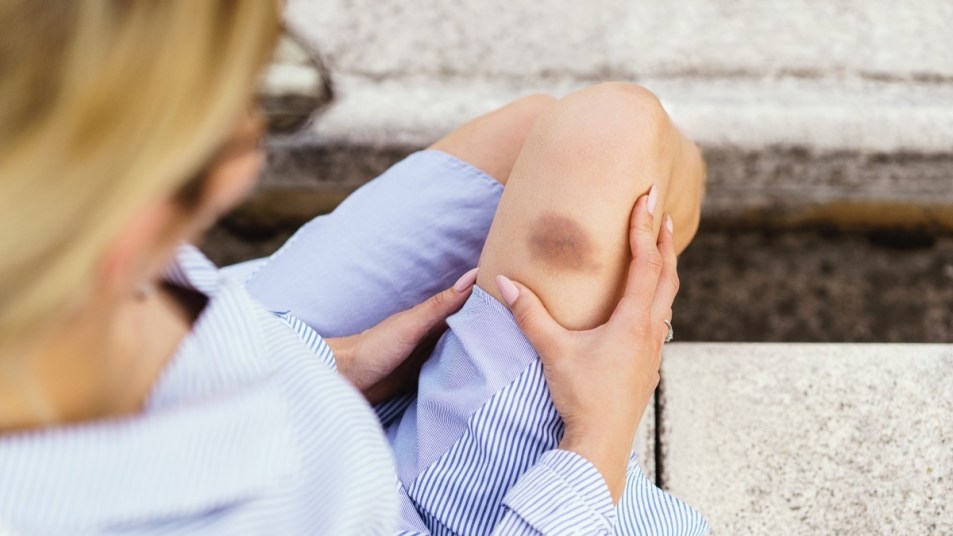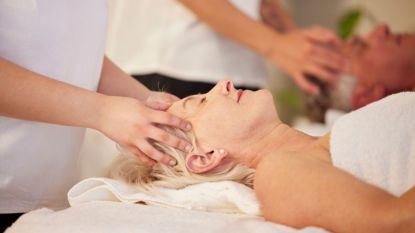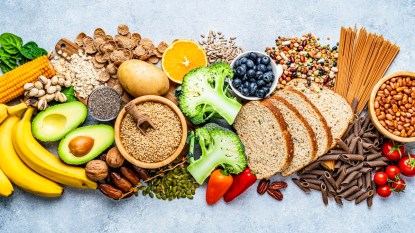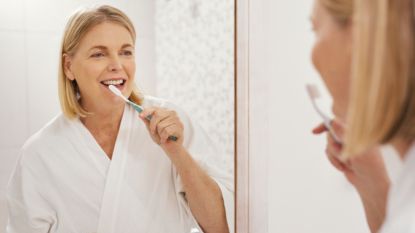Why Women Over 50 Are Prone To Bruising Easily + Dermatologists’ Tricks To Speed Healing
Wearing this accessory every day may be increasing your risk of a bruise

Imagine a rubber band that’s been used for years and has lost its elasticity. It no longer stretches and snaps back as easily, and any slight force can cause it to break. New York City-based dermatologist Jessica Krant, MD, uses this analogy to explain why we’re prone to bruising easily as we age.
“It’s like what happens to older capillaries in the skin, especially when the skin has been extensively sun damaged over the decades,” says Dr. Krant, who is also President of the New York County Medical Society. While younger people can also bruise, it generally requires a more significant impact to cause one. As we age, the increasing fragility of the skin’s blood vessels makes bruising more common and the resulting blemishes more visible.
So, what exactly can you do about it? Read on to find out more common causes of bruising easily, plus how to speed healing.
What age has to do with bruising easily
When you bump against something, your body normally responds by forming clots to stop the bleeding and prevent bruising. Sometimes, your blood can’t form clots as it should, which makes you prone to bruising easily.
“A bruise, or ecchymosis, is a discoloration of the skin caused by a rupture in a blood vessel, leading to blood pooling under the skin,” explains dermatologist Diane Berson, MD. “This usually happens due to trauma, such as banging or scratching the skin, or even from a bug bite.”
But what about those large purplish-red bruises that appear on the backs of hands and forearms as we get older? Known as actinic purpura, these result from normal aging combined with sun damage. They can occur with minor trauma or even no injury at all. While not harmful or indicative of a serious condition, they can last up to three weeks and may cause skin discoloration even after they fade.
“Our skin becomes thinner and more fragile as we age, losing the protective layer of fat that cushions blood vessels,” explains Dr. Krant. This loss means that the skin cannot repair itself as efficiently, making it more prone to damage and dryness. Surface blood vessels, now more exposed, become brittle and prone to breaking.
Plus, the cumulative effects of sun exposure through the years cause the skin to lose collagen and elastin. This further thins the skin, making it more susceptible to damage, Dr. Berson adds.
More common causes of bruising easily
1. Menopause
“Estrogen plumps the skin and stimulates fibroblasts, which make collagen and elastin, contributing to a nice, thick dermis,” Dr. Berson explains. “Post-menopause, your skin gets drier, thinner and more fragile. You also lose your fat content, making your blood vessels more prone to breaking and causing bruising.”
2. Heavy jewelry

Wearing heavy accessories can also contribute to bruising. The weight and pressure can cause minor damage to the skin and underlying blood vessels. And repeated pressure, even if not severe, can lead to noticeable bruises. “I always ask my patients if they’re wearing a heavy watch, because even that can cause a big bruise,” Dr. Berson says.
3. Certain medications
“Certain medications that ‘thin’ blood to reduce the risk of strokes and heart attacks also make it harder for clots to form quickly when the skin is injured,” Dr. Krant says. “Bruises may spread further before the clotting system can catch up to stop bleeding within the skin.”
These medications include aspirin, systemic and topical steroids as well as, nonsteroidal anti-inflammatory drugs (NSAIDs) like ibuprofen. Some over-the-counter drugs and herbal supplements and otherwise healthy foods can also thin the blood and up the odds of bruising easily. That includes garlic, ginger, ginkgo, green tea, salmon, turmeric and high doses of Vitamin E.
Prone to bruising easily? 4 ways to speed healing
1. Reach for arnica
The alpine plant arnica is a natural remedy that reduces inflammation and promotes healing, per a study in the Journal of the Royal Society of Medicine. It’s available in oral and topical forms. One arnica-infused moisturizer Dr. Berson recommends is DerMend Moisturizing Bruise Formula.
That said, “in research on surgery-related bruising, only oral arnica started as much as two weeks prior to surgery showed any predictable improvement in bruise healing time,” notes Dr. Krant. If you’re prone to bruising easily and prefer an oral arnica tablet, try Boiron Arnicare Bruise Tablets.
2. Relax with a cold compress
Applying a cold compress immediately after an injury can reduce blood flow to the area, minimizing the size of the bruise, found a study in the Journal of Nursing Scholarship. Use a cloth-wrapped ice pack for 10-20 minutes as needed.
3. Keep the injured area elevated
If possible, elevate the bruised area above the level of your heart to reduce blood flow and swelling. “Periodically elevate the area throughout the day and while sleeping, especially for the first few days after the injury,” Dr. Berson recommends. “This can significantly reduce swelling.”
4. Apply vitamin K cream
Use over-the-counter creams and ointments containing vitamin K to help reduce bruising and speed healing. Vitamin K aids in the formation of clotting factors, proteins needed for blood coagulation. This reduces the likelihood of blood vessel rupture for those prone to bruising easily.
How to curb your risk of bruising easily
1. Smooth on sunscreen
Dr. Krant stresses protecting the skin from sun damage, especially if you bruise easily. “There are no skin products that can totally reverse the tendency to actinic purpura once the skin is already aged,” she says. “But starting prevention decades earlier with daily sun protection is the best measure of all.”
This means using a broad-spectrum sunscreen with at least SPF 50 daily, even on cloudy days. Two to try: Cetaphil Sheer Mineral Sunscreen SPF 50 and Bath & Body Works SPF 50 Sunscreen Lotion.
2. Moisturize regularly

“The ingredients that usually help hydrate the skin are humectants, which hold water in the skin,” says Dr. Berson. She notes that well-hydrated skin is more resilient and less prone to tearing or damage. Humectants include hyaluronic acid and glycerin. Products containing ceramides or lipids are also effective moisturizers, as well as those with niacinamide, a B vitamin that helps plump the barrier.
Occlusives, such as petroleum jelly (like Vaseline), can hold all these ingredients in. Some products are even formulated with vitamin K, which is involved in clotting. Dr. Berson recommends Dermend Specialized Fragile Skin Moisturizing Cream.
3. Snack on water-rich foods
Water-based foods can also support skin health for those susceptible to bruising easily. “Eating foods like cucumbers, watermelon and other fruits and vegetables with high water content can help,” says Dr. Berson. “It’s also important to have a balanced diet that includes vitamins C and K. Citrus fruits, green leafy vegetables, and fortified cereals are great sources.”
Also smart: Drink plenty of water to keep your skin hydrated from the inside out. Aim for at least eight 8-oz. glasses daily.
See also: How Much Water Should You Drink in a Day? A Doctor + Nutritionist Settle the Debate
When to be concerned about bruising easily
Sudden and frequent bruising can sometimes indicate underlying health issues such as liver disease, blood clotting problems or cancers like leukemia or lymphoma. Bug bites, especially from ticks, can sometimes mimic bruises and should be checked if you’re also experiencing headaches, fevers or joint pain.
Dr. Krant advises seeking medical attention if bruises are rapidly increasing in frequency, are lumpy or raised, painful or especially large, especially if they’re accompanied by other symptoms like fatigue or fever.
More ways to treat common skin conditions naturally:
Bothered by Red, Itchy Skin on Hot Days? Doctors Share How To Get Rid of a Heat Rash Quickly
Doctors Say These Kitchen Staples Speed Healing of a Painful Skin Ulcer
A Top Sunburn Self-Care Remedy May Already Be in Your Fridge — Plus See What Doctors Say To Skip
This content is not a substitute for professional medical advice or diagnosis. Always consult your physician before pursuing any treatment plan.













